
Wagner Guards Kill 11 Villagers at Central African Gold Mine
Blood and Gold: Wagner's Deadly Grip on Central African Republic's Mineral Wealth
In the darkness of a quiet night, desperation drove young men from villages near the Ndassima gold mine to risk their lives for scraps of gold residue. By dawn, at least 11 of them lay dead, shot by guards at the Wagner-controlled mining operation in the Central African Republic. The massacre, 450 kilometers east of the capital Bangui, marks the latest bloody chapter in a saga of resource exploitation that has seen Russian mercenaries turn the country's mineral wealth into a killing field.

"The Right to Life Does Not Exist": Voices from a Mourning Community
"It is a shame that the right to life does not exist," said Serge Pounematchi, whose son was among those killed. His words cut through the haze of grief that has settled over nearby villages, where memorial services have already begun for the deceased.
The victims—primarily young men from surrounding communities—were at the site scavenging for gold residue when they were gunned down, according to local residents and aid workers familiar with the incident. Two humanitarian workers, speaking on condition of anonymity due to safety concerns, confirmed that most victims were shot dead. Meanwhile, some villagers remain unaccounted for, their fates unknown.
Constantin Pounoukouzou, a local villager, explained the economic desperation driving these dangerous nighttime forays: unemployed youth, faced with crushing poverty, feel compelled to enter the restricted mine despite knowing the risks. Since Wagner seized control of Ndassima in 2021, violently ousting artisanal miners who once worked there legally, locals have been barred from accessing what was once a community lifeline.
Local authorities have maintained a conspicuous silence, offering no official confirmation of the killings, while officials have not responded to media inquiries.
Wagner's Shadow Empire: Where Violence Meets Profit
The Wagner Group, a Russian paramilitary organization with deep ties to the Kremlin, has operated in the Central African Republic since at least 2017, when President Faustin-Archange Touadera invited them to bolster government forces against rebel factions. What began as military support quickly evolved into a resource grab, with Wagner personnel seizing control of lucrative gold and diamond mining operations across the country.
The Ndassima gold mine, seized in 2021, represents just one jewel in Wagner's Central African crown. But behind the glitter of gold lies a dark reality: human rights abuses, extrajudicial killings, and violent crackdowns on civilians have become hallmarks of Wagner's presence near mining sites.
Multiple humanitarian organizations and local residents have documented summary executions and disappearances. Wagner personnel also serve as bodyguards for President Touadera and played a pivotal role in his 2023 referendum to extend his time in office—a classic example of what critics call "weaponized poverty," where extreme economic desperation is exploited for both mercenary and state control.
The Deadly Economics of Desperation
The blood spilled at Ndassima reflects a cruel economic reality. In a region plagued by poverty and unemployment, local villagers face an impossible choice: risk death by entering restricted mining areas at night, or watch their families starve. This economic desperation forms the backdrop to Wednesday's violence, part of a broader pattern that has seen dozens of similar incidents since Wagner's arrival.
"These aren't isolated incidents," notes a regional security analyst who requested anonymity. "When you combine resource wealth, armed mercenaries with impunity, and desperate poverty, bloodshed becomes inevitable."
The Ndassima operation itself, while producing only 1-2 tons of gold annually—a mere 0.05% of global mine supply—represents an in-situ metal value exceeding US $1 billion, according to Treasury estimates. This makes it a strategic asset not for its contribution to global markets but for its value as political hard currency for both Moscow and Bangui.
Gold, Sanctions, and the Global Money Trail
While the Ndassima deaths alone won't significantly impact global gold prices, they highlight growing concerns about "dirty gold" and the compliance challenges facing legitimate market participants. SPDR Gold Shares ETF, a leading gold investment vehicle, traded at $308.39 on Friday with steady volume of over 5.5 million shares, reflecting gold's continued appeal amid geopolitical uncertainty.
The massacre occurs against a backdrop of complex sanctions. The U.S. Treasury's Office of Foreign Assets Control blacklisted Midas Ressources and other Wagner fronts in 2023-24, but gold continues to flow through established laundering routes—typically trucked through Bambari to Douala, and ultimately to Dubai, where it enters global markets through free-zone refineries.
A March 2025 UAE-CAR Comprehensive Economic Partnership Agreement aims to triple bilateral trade, potentially creating new challenges for regulators tracking conflict gold.
Investment Implications: The Shadow Gold Premium
For investors, the Ndassima massacre signals widening compliance and reputational risks around shadow-sourced African gold that finances Russian operations. Market analysts suggest several strategic responses to this evolving landscape:
"The premium on traceable gold with transparent sourcing will likely grow," suggests one commodity strategist at a major European bank. "We're seeing investors increasingly willing to pay slightly higher premiums for OECD-traceable ounces to avoid regulatory complications."
The coming 12-24 months may see tightening compliance measures, including stricter London Bullion Market Association responsible-sourcing audits and potentially expanded secondary sanctions against facilitators in global trading hubs.
For equity investors, exposure varies significantly by category. Major OECD miners like Newmont and Agnico Eagle may gain relative premium, while junior miners lacking secure offtake channels face greater discounts. Companies with exposure to UAE logistics or refining operations could see increased regulatory scrutiny following the massacre.
A Lethal Convergence with Global Implications
The Ndassima killings exemplify a lethal convergence of external exploitation, state complicity, and local desperation. While Wagner is being rebranded into the Russian Ministry of Defense-controlled "Africa Corps," its extractive model continues unabated, creating what one regional expert describes as "mini-states and criminalized economies" across Africa.
As memorial services continue for the 11 victims, their deaths spotlight a system where "security" is exchanged for blood and gold, and where the local population bears the heaviest cost. For investors and policymakers alike, the message is clear: what happens in remote African mines increasingly reverberates through global markets, regulatory frameworks, and geopolitics.
Until these underlying drivers—economic exclusion, state weakness, and the mercenary economy—are addressed, the blood-gold nexus will continue to shape both local tragedies and global financial flows.
Disclaimer: This analysis contains forward-looking perspectives based solely on current market data and established indicators. Past performance does not guarantee future results. Readers should consult financial advisors for personalized investment guidance.